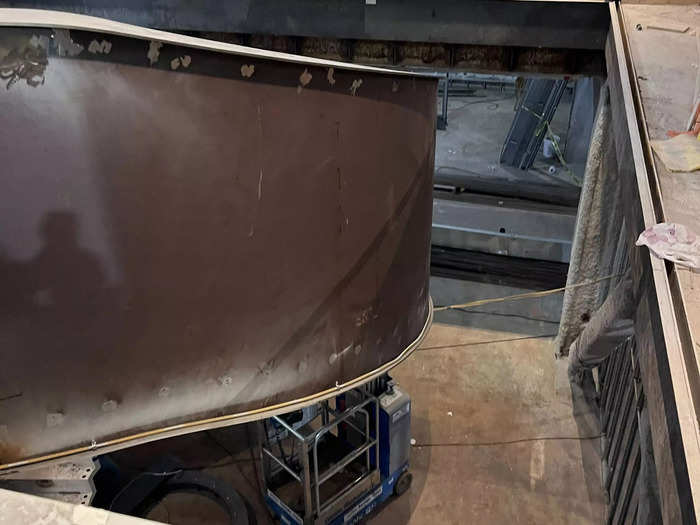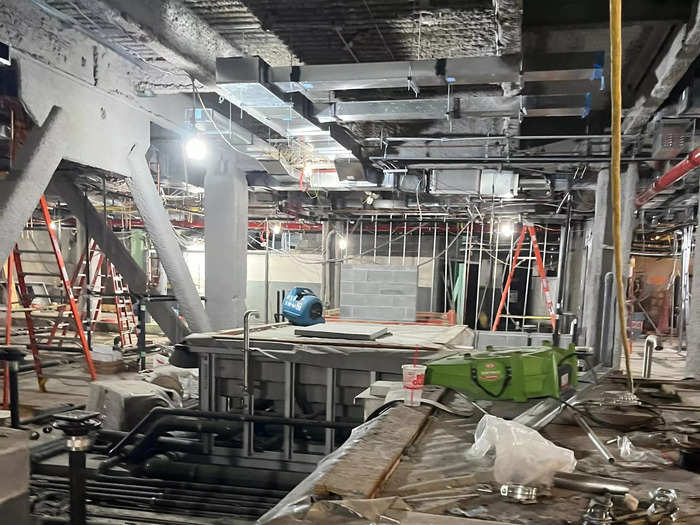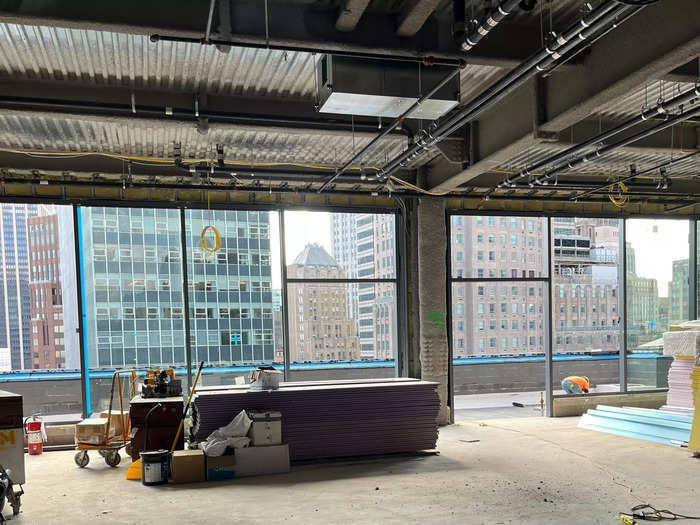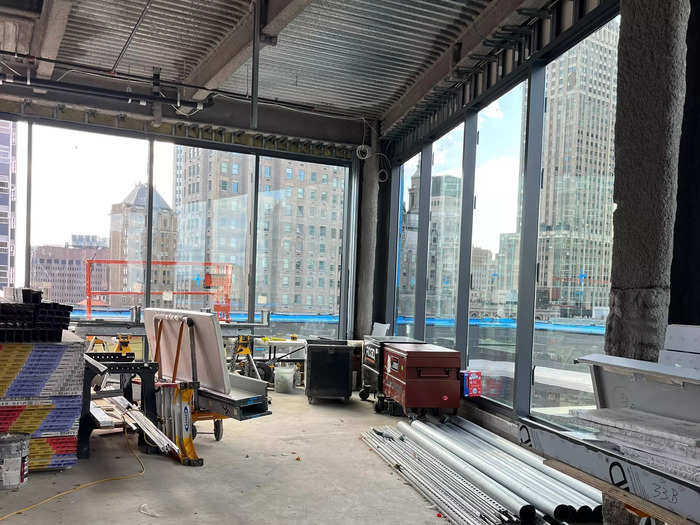The author at 160 Water Street.Juliana Kaplan/Insider
- Offices across the country are sitting vacant as housing remains scarce and expensive.
- Some developers and cities are trying to tackle both problems and turn old offices into apartments.
The bedroom I was standing in was once a corner office.
Drenched in light — and fitted with tall windows — you'd never know you were sleeping in what was once a boss' headquarters. That's the whole point at 160 Water Street.
In a past life, 160 Water Street was an office building in New York City's financial district. Its new developers told me it wasn't a very exciting one; it was lined with perimeter offices that ate up the sunlight, with cubicle-dwelling workers stuck in the middle.
Now, those former corner offices are apartments full of light and amenities that would make any New Yorker swoon — there are dishwashers, washers and dryers, spacious refrigerators, and, in the two-bedroom unit I saw, two sleek bathrooms. You can control the lights and the AC with your phone, which you can also use in lieu of a key.
It's the next big bet that cities like New York are making. In the battle over remote work, things have pretty much settled — the people who are going in are going in, and the people who are staying remote or hybrid will do pretty much anything to keep it that way. In New York City, that's led to a nearly 18% office-vacancy rate in June and July — a record high, the real-estate firm Colliers says. That's led the city to pivot from a push for RTO to a new plan: freeing up more of those vacant office buildings to become apartment buildings.
"What we are hearing from business owners is that hybrid work is here to stay, and we're trying to plan for a future that recognizes it," Dan Garodnick, the director of New York City's Department of City Planning, told Insider.
Standing next to 180 Water Street — an office building that was converted into units back in 2017 — 160 Water Street is preparing to welcome tenants by the end of the year. It's scheduled to be fully completed by spring or summer of next year. The building, which is being developed by the architecture firm Gensler and the development-and-investment firm Vanbarton Group, will have 588 units.
I got the opportunity to tour the building and saw just how much the rise of remote work is shaping how we use our spaces.
You can still see some remnants of the office, like in the lobby
The lobby at 160 Water Street. Juliana Kaplan
The office floor plan was most evident in the new apartment building's lobby, although the space has literally been cracked open: Developers added a new grand staircase that residents can take down to a suite of amenities.
The lobby will include a concierge desk, a fireplace, and a coffee bar — as well as a new public plaza right outside, a big redesign for a tucked-away side street. All of those are meant to help cultivate a hospitality-like vibe, the developers said.
They also speak to Americans' growing desire for third places: places that aren't their houses or the office, but somewhere they can congregate. The need for those spaces has become even more pronounced as the plunge into remote and hybrid work has left white-collar workers lonely during the workday. The spaces at 160 Water mean residents can feel like they're comingling outside of work and their apartments but don't actually have to leave their houses — a first-and-a-half space.
The basement will hold a spa, a bowling alley, a gym, and a kids' room, among other amenities.
What will be the spa at 160 Water. Juliana Kaplan/Insider
The building will hold a two-lane bowling alley, a sports-simulation room, a game room, a kids' room, and a DIY room. And of course, there will be a spa.
It's part of the "amenity war," as the Manhattan-based architect John Cetra previously told Insider: The newly developed apartments aren't just competing to be homes but social spaces populated by people who can swing downstairs to paint, bowl, and then take a cold plunge.
"It almost turns the building into a club, and the club gives you all of these amenities, and part of membership in the club includes an apartment," Cetra previously said. "The whole social aspect of it, I think, has become a big deal."
Part of the renovation from office building to apartments was literally growing the building and getting creative about where to tuck in amenity spaces. The extra-tall 14th floor used to host mechanical equipment; that got divided into two floors. In total, the building's developers added six new floors, which helped create more space after developers had to cut out void "blind shafts" around the building, as Insider previously reported. And things like bowling alleys or spas don't need natural light filtering in from outside.
The building's big outdoor amenity space means weddings could happen next to conference rooms.
The amenity floor at 160 Water Street. Juliana Kaplan/Insider
The 28th floor of 160 Water is completely devoted to amenities — which will include coworking spaces.
Residents will have access to a wraparound terrace, an outdoor grill, a fire pit, reservable party spaces (equipped with kitchens), and a large bar area that will partner with local restaurants and drink spots for pop-ups. It's again reminiscent of an exclusive club, amenities and all. But the fees are currently not set.
Many Americans, especially lonely Gen Zers, are spending hundreds, if not thousands, of dollars on gym memberships, social clubs, and dinners out to socialize. 160 Water Street — where rents will range from $3,500 for a studio to $7,500 for a two-bedroom — is trying to bundle all of those experiences.
That appears to be a byproduct of a remote-shaped economy where younger Americans are spending more than they did pre-pandemic just to get face time with new potential friends. If they're already going to be spending a significant portion of their incomes on rent, it makes sense to have an apartment building be a one-stop shop.
The coworking space was one of the real stars of the show.
The coworking space at 160 Water. Juliana Kaplan/Insider
Of course, a 2023 building wouldn't be complete without a new coworking space.
While the coworking area takes up a large footprint on the 28th floor, you wouldn't know that it was, paradoxically, once an office. The area will have tall windows and a terrace, and when it's complete, it will include Zoom rooms, conference rooms, and a conference table. It's a space you could invite your coworkers to (and probably become the envy of the office).
That an office was reconstructed into a space that's a home first and office second seems almost too on the nose when it comes to how remote work has reshaped our environments. Even the building's location speaks to that.
While New York's financial district isn't as resident-averse as areas like Times Square, it's historically been office-centric. However, it's also ripe for conversion: A working paper for the National Bureau of Economic Research by Arpit Gupta, Candy Martinez, and Stijn Van Nieuwerburgh found that over 2,000 office buildings across the US were candidates for office-to-residential conversion — in New York City, most of them are clustered in the financial district and midtown.
Not-so-cool neighborhoods — but convenient to transit and offices — could be entirely reshaped if developers keep at it. One of the appeals of 160 Water is a one-stop shop for your third-space needs. But it also has another perk that might become particularly relevant as Americans set off into a permanently hybrid future: the ability to walk to your office building — that is, if it hasn't become an apartment building, too.




